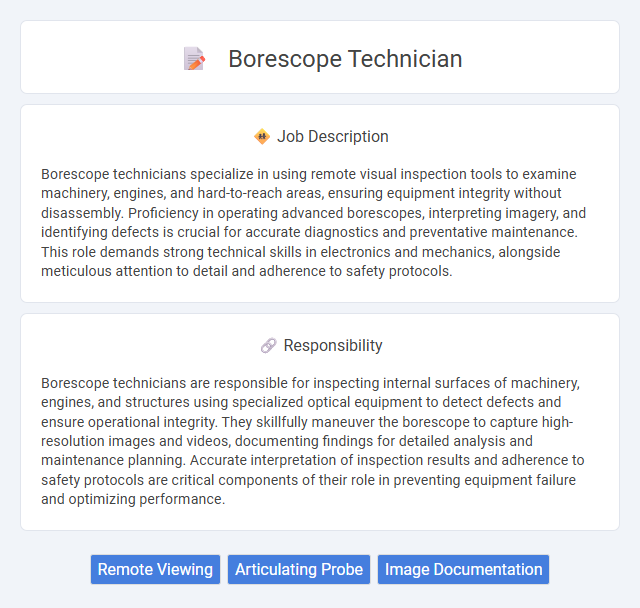
Borescope technicians specialize in using remote visual inspection tools to examine machinery, engines, and hard-to-reach areas, ensuring equipment integrity without disassembly. Proficiency in operating advanced borescopes, interpreting imagery, and identifying defects is crucial for accurate diagnostics and preventative maintenance. This role demands strong technical skills in electronics and mechanics, alongside meticulous attention to detail and adherence to safety protocols.
Individuals with strong attention to detail and good hand-eye coordination are more likely to excel as borescope technicians. Those comfortable working in confined spaces and able to maintain focus on repetitive tasks may find the job suitable. People prone to claustrophobia or poor manual dexterity may face challenges in this role.
Qualification
Borescope technicians require a strong background in mechanical or electrical engineering, often supported by certifications in nondestructive testing (NDT) such as ASNT Level I or II. Proficiency in operating advanced inspection equipment, alongside detailed knowledge of interpreting imagery from borescopes, is essential. Experience in aerospace, automotive, or industrial maintenance sectors significantly enhances a candidate's qualifications.
Responsibility
Borescope technicians are responsible for inspecting internal surfaces of machinery, engines, and structures using specialized optical equipment to detect defects and ensure operational integrity. They skillfully maneuver the borescope to capture high-resolution images and videos, documenting findings for detailed analysis and maintenance planning. Accurate interpretation of inspection results and adherence to safety protocols are critical components of their role in preventing equipment failure and optimizing performance.
Benefit
A borescope technician likely benefits from enhanced career opportunities due to the growing demand for non-destructive inspection in various industries, including aerospace and manufacturing. This role probably offers hands-on experience with advanced imaging technology, improving technical skills and employability. Job stability and potential for higher earnings may also be expected as expertise in borescope inspection becomes increasingly valuable.
Challenge
Borescope technician roles likely involve navigating complex inspections within confined and hard-to-reach spaces, demanding high precision and attention to detail. The challenge probably lies in interpreting visual data accurately to diagnose mechanical issues without direct access. Proficiency with advanced imaging technology may increase the probability of successful fault detection and repair recommendations.
Career Advancement
A Borescope technician role offers significant opportunities for career advancement through gaining expertise in non-destructive testing (NDT) and inspection technologies. Mastery of borescope equipment and interpretation of detailed internal images often leads to specialization in aerospace, automotive, or industrial sectors, enhancing job prospects and salary potential. Pursuing certifications such as ASNT Level II or III can further elevate a technician's qualifications, opening doors to supervisory or engineering positions.
Key Terms
Remote Viewing
Borescope technicians specialize in remote viewing technology to inspect internal components of machinery and infrastructure without disassembly, enhancing diagnostic accuracy and reducing downtime. They operate advanced optical devices equipped with cameras and light sources, transmitting real-time videos or images to monitors for detailed analysis in sectors like aerospace, manufacturing, and automotive. Expertise in interpreting visual data remotely allows borescope technicians to detect cracks, corrosion, and blockages, ensuring maintenance efficiency and safety compliance.
Articulating Probe
Borescope technicians specializing in articulating probes perform detailed inspections in hard-to-reach areas, ensuring precise manipulation and enhanced visual access. Mastery of articulating probe controls allows technicians to navigate complex internal structures such as engines, turbines, and pipelines, improving defect detection and maintenance accuracy. Expertise in imaging technology and probe articulation directly contributes to effective non-destructive testing and troubleshooting in aerospace, automotive, and industrial sectors.
Image Documentation
Borescope technicians specialize in capturing high-resolution visual inspections inside machinery, pipelines, and engines using advanced borescope cameras, ensuring precise image documentation for maintenance and diagnostic purposes. They meticulously record and annotate images to highlight potential defects, corrosion, or wear, facilitating accurate reporting and remote expert analysis. Proficient in both manual and digital imaging tools, these technicians deliver critical visual data that supports asset reliability and safety compliance.
 kuljobs.com
kuljobs.com